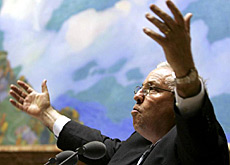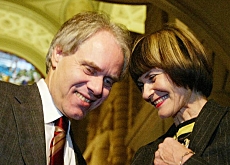Consensus politics is losing its champions

Political scientist Pascal Sciarini tells swissinfo that consensus politics is failing in its main aim - namely to prevent policy from being decided at the ballot box.
The reason, he says, is that halfway into the legislative term, Switzerland’s consensus-driven political system is being undermined by both left and right.
The champions of consensus – the centre-right parties – were dealt a blow in 2003, when the rightwing Swiss People’s Party’s most prominent representative, Christoph Blocher, was elected to the seven-member cabinet.
His party had emerged as the big winner of the parliamentary elections, and lawmakers – who elect the power-sharing cabinet – duly tossed out one of the Christian Democrats to make room for Blocher.
With the right in ascendant, it was generally seen as only a matter of time before divisions opened up in the cabinet and parliament.
Two years on, and Sciarini, director of the faculty of political science at Geneva University, says the growing influence of the People’s Party has become unmistakable.
The government is currently working out plans to privatise the country’s leading telecoms operator, Swisscom, Blocher himself is leading efforts to reform the public administration, and public spending cuts are in the works.
swissinfo: Are these examples more than just symbolic attempts to move policy to the right?
Pascal Sciarini: It is true that the shift to the right has had a limited impact on Switzerland’s multi-party government and the system of direct democracy.
So far there are not very many examples to show how the political right has managed to convince parliament to follow suit.
The exception to the rule is possibly the toughening of the asylum law under the auspices of the hard-line Justice Minister Blocher.
It has often become even more difficult for the political right to push through its ideas in parliament and win over voters in possible referendums.
In some cases the two main centre-right parties, the Radicals and Christian Democrats play a decisive role. But both of them appear to struggle to define their position [in what is a more polarised political environment].
swissinfo: Will the two centre-right parties continue to lose ground?
P.S.: The two traditional pillars of Switzerland’s party-political system are facing bigger difficulties than ever before.
Not only do they have to find their place between the People’s Party and the centre-left Social Democrats when it comes to legislation in parliament. But they also have to take into account how their policies could affect voters’ opinions in the next elections.
Both of them have been learning the hard way over the past 12 years what it means to be a governing party. The Radicals in particular have been staunch supporters of the cabinet, including of proposals that went to nationwide votes.
This policy obviously doesn’t pay off if you look at the results of the elections to the federal parliament since the 1990s.
swissinfo: Can the Swiss political system adapt sufficiently to the trends?
P.S.: I don’t think so. The increasing polarisation has paralysed the system and made it impossible for the government to agree on key issues, including European integration, balancing the budget and institutional reforms.
Is seems that a consensus-driven four-party cabinet is no longer a safeguard for the government to ward off the threat of referendums.
In four out of five cases one of the governing parties – mainly the People’s Party or the Social Democrats – are playing the part of an opposition group.
The question is whether there is any point in maintaining the consensus system if it fails to achieve its main aim – to prevent a challenge at the ballot box.
swissinfo: Was it a mistake to believe that the opposition figurehead Blocher could be tamed by electing him to the cabinet?
P.S.: I said from the very beginning that I didn’t believe Blocher would be willing to fit into the Swiss mould of collegiality – the idea of shared responsibility. And I feel vindicated by the facts.
Blocher uses this system purely for his own ends and thereby weakens the government. It is inevitably weakened if divisions within the cabinet are highlighted in public.
swissinfo: What needs to be done to strengthen the cabinet?
P.S.: I know that I won’t be taken seriously, but my suggestion is to replace the four-party system by a formal coalition of only three parties.
At the same time more checks and balances could be introduced between parliament and the government, such as a vote of confidence or the right to dissolve parliament.
I also recommend the creation of the post of a prime minister [instead of seven cabinet ministers with equal powers and the largely ceremonial post of president].
A formal head of government could put pressure on parliament and the cabinet to cooperate more closely and commit the political parties to negotiate common political targets.
And it would put an end to the double-faced tactics of some parties which are in government and in opposition at the same time.
swissinfo-interview: Alexandra Richard
The rightwing Swiss People’s Party emerged as the strongest group in the House of Representatives after the 2003 parliamentary elections.
It holds 55 seats in the House (+11), ahead of the centre-left Social Democrats with 52 seats (+1).
The two centre-right parties each lost 7 seats, leaving 36 seats for the Radicals and 28 for the Christian Democrats in the House.
The largest party outside government is the Greens with 13 seats (+4).
In the Senate the Christian Democrats are the biggest group (15 seats) ahead of the Radicals (13), the Social Democrats (9) and the People’s Party (8).

In compliance with the JTI standards
More: SWI swissinfo.ch certified by the Journalism Trust Initiative


You can find an overview of ongoing debates with our journalists here. Please join us!
If you want to start a conversation about a topic raised in this article or want to report factual errors, email us at english@swissinfo.ch.